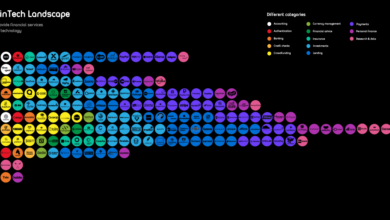
Digital Transformation in Africa A New Dawn
Digital transformation in Africa is rapidly reshaping the continent’s landscape, bringing with it a wave of innovation and opportunity. From e-commerce startups to digital financial services, the possibilities are vast. This exploration delves into the key aspects of this transformation, examining the infrastructure, skills, and societal impact.
This article will look at the opportunities and challenges of digital transformation in Africa, examining everything from the current state of digital infrastructure to the potential economic and social benefits. We’ll also highlight the vital role of government initiatives and successful case studies to showcase the progress and potential of the digital revolution on the continent.
Introduction to Digital Transformation in Africa

Digital transformation in Africa is the process of leveraging digital technologies to improve efficiency, enhance productivity, and drive innovation across various sectors. This involves adopting new technologies like cloud computing, artificial intelligence, and mobile-first strategies to fundamentally change how businesses operate and governments serve citizens. It’s not just about adopting technology; it’s about strategically integrating it into existing workflows and systems to create value and address specific challenges.This transformation is crucial for Africa’s economic growth and social development.
By embracing digital solutions, African countries can address infrastructure gaps, improve access to education and healthcare, and foster entrepreneurship. This transformation is multifaceted, encompassing various industries and impacting diverse populations.
Successful Digital Transformation Initiatives in Specific African Countries
Several African countries have already demonstrated successful digital transformation initiatives. For instance, Kenya’s mobile money platform, M-Pesa, has revolutionized financial inclusion, allowing millions of previously unbanked individuals to access financial services. Similarly, Rwanda’s use of digital platforms for government services, like online tax payments and citizen portals, has streamlined processes and improved transparency. These examples showcase how digital tools can effectively address specific needs and create opportunities.
Key Factors Driving Digital Transformation in Africa
Several factors are driving the digital transformation wave across the continent. Improved internet access and increasing mobile phone penetration are crucial enablers. Growing entrepreneurial activity and a young, tech-savvy population are further contributing to the momentum. Government initiatives, such as supportive policies and digital infrastructure investments, are also playing a significant role in fostering this transformation.
Differences Between Traditional and Digital Business Models in Africa
The following table illustrates the key differences between traditional and digital business models in Africa.
| Characteristic | Traditional Business Model | Digital Business Model |
|---|---|---|
| Customer Interaction | Face-to-face interactions, limited communication channels | Online platforms, personalized communication, customer relationship management systems |
| Operations | Manual processes, limited data utilization | Automated processes, data-driven decision making, supply chain optimization |
| Market Reach | Limited geographic reach, often localized | Global reach, access to wider customer base |
| Cost Structure | High overhead costs, traditional marketing channels | Potential for lower overhead costs, digital marketing, cost optimization |
| Scalability | Limited scalability | High scalability, rapid expansion potential |
This table highlights the transformative impact of adopting digital tools on various aspects of business operations. Digital models are better suited to adapt to evolving market demands, foster global competitiveness, and improve overall efficiency.
Infrastructure and Technology
Africa’s digital transformation journey is deeply intertwined with its infrastructure and technological landscape. The continent boasts a vibrant mobile phone market, which often serves as a primary gateway to the internet for many, but significant disparities in access and quality persist across different nations. This uneven digital infrastructure presents both challenges and opportunities for driving progress in various sectors.
Current State of Digital Infrastructure
The digital infrastructure in Africa varies significantly from country to country. While some nations have made considerable strides in expanding internet access and improving connectivity, others face significant hurdles. Factors such as geographical location, political stability, and economic conditions heavily influence the availability and quality of digital infrastructure. The uneven distribution of infrastructure often leads to digital divides, impacting access to essential services and opportunities for economic growth.
Internet Access and Connectivity Challenges and Opportunities
Internet access remains a crucial factor in digital transformation, impacting various aspects of life, from education to commerce. Africa faces several challenges in bridging the digital divide, including limited infrastructure, high costs of internet access, and a lack of digital literacy skills. However, the continent also presents exciting opportunities for leveraging mobile technology and innovative solutions to improve connectivity.
For example, initiatives like deploying fiber optic networks and expanding mobile broadband coverage can address the challenges of limited infrastructure and high costs. Increased investment in digital infrastructure can unlock economic opportunities and drive social progress.
Key Technological Trends Impacting Digital Transformation
Several key technological trends are significantly impacting digital transformation in Africa. The increasing adoption of mobile technology, particularly mobile money, is a prominent trend, providing financial inclusion for millions. The growth of cloud computing and big data analytics is opening up new possibilities for businesses and governments to improve efficiency and decision-making. Furthermore, the rise of e-commerce and digital platforms is transforming the way goods and services are delivered.
These technological trends are shaping the future of Africa’s digital landscape and offering innovative solutions to address specific challenges.
Mobile Penetration Rates and Internet Access Comparison
The table below provides a comparative overview of mobile penetration rates and internet access across various African nations. These figures highlight the disparities in digital infrastructure and the need for targeted interventions to bridge the digital divide. The data reflects the current state and underscores the importance of continued investment in infrastructure development.
| Country | Mobile Penetration Rate (%) | Internet Access (%) |
|---|---|---|
| Nigeria | 90+ | 50-60 |
| South Africa | 85+ | 60-70 |
| Kenya | 80+ | 45-55 |
| Egypt | 80+ | 50-60 |
| Morocco | 70+ | 55-65 |
| Ghana | 75+ | 40-50 |
| Tanzania | 60+ | 30-40 |
Note: Data for mobile penetration and internet access varies depending on the source and the year of measurement. These figures represent approximate ranges. The specific values for each country are subject to change and should be confirmed through reliable sources.
Digital Skills and Talent
The digital revolution is transforming economies worldwide, and Africa is no exception. However, a critical component for success is a skilled workforce capable of navigating and leveraging the opportunities presented by digital technologies. This necessitates a focused approach to digital skills development, addressing both the needs of individuals and the demands of businesses across various sectors. This is a vital aspect of Africa’s digital transformation journey, enabling greater participation in the global digital economy.Developing digital skills is not just about acquiring technical knowledge; it’s about fostering a mindset that embraces innovation, adaptability, and problem-solving in the digital age.
This requires targeted interventions that empower individuals with the practical tools and knowledge to thrive in a rapidly evolving technological landscape. It also necessitates a concerted effort to bridge the skills gap in key sectors and foster collaboration between educational institutions, businesses, and government agencies.
Importance of Digital Skills Development
Digital skills are becoming increasingly important for individuals and businesses in Africa. Individuals with digital skills are better equipped to secure employment, improve their livelihoods, and participate actively in the digital economy. Businesses that possess digital skills within their workforce are better positioned to innovate, compete effectively, and achieve sustainable growth. This includes the ability to use digital tools for communication, collaboration, and problem-solving.
Strategies for Upskilling and Reskilling the African Workforce
Various strategies can be employed to upskill and reskill the African workforce. These include establishing partnerships between educational institutions and businesses, providing targeted training programs for specific sectors, promoting online learning platforms, and creating mentorship programs to support the development of digital skills. Furthermore, fostering a culture of continuous learning and adaptation is crucial to keep pace with the ever-evolving digital landscape.
Digital Talent Gap in Different Sectors
The digital talent gap varies significantly across different sectors in Africa. For example, the technology sector often faces a shortage of skilled professionals in areas like software development, data science, and cybersecurity. Other sectors, like finance and healthcare, also require digital skills for improved efficiency and service delivery. Addressing these sector-specific gaps requires targeted training programs and initiatives to equip the workforce with the necessary competencies.
Comparison of Digital Skills Training Programs
Digital skills training programs vary across African countries, reflecting diverse national priorities and resource availability. Some countries prioritize developing foundational digital skills, while others focus on advanced technical competencies. This variation can be seen in the curriculum and methodologies used in different training programs. Furthermore, the quality and accessibility of these programs differ, influencing the overall effectiveness of skill development efforts.
The availability of resources, funding, and instructors play a significant role in the success of these initiatives.
Examples of Successful Programs
Several African countries have implemented successful digital skills training programs, demonstrating the feasibility of addressing the talent gap. These programs have focused on bridging the skills gap in specific sectors and creating opportunities for employment. For example, some programs have partnered with companies to provide internships and apprenticeships to ensure practical application of the skills learned. This ensures graduates are equipped for real-world challenges and fosters a sense of entrepreneurship.
Economic Impact of Digital Transformation
Africa’s digital transformation presents a compelling opportunity to reshape its economic landscape. From fostering entrepreneurship to unlocking new markets, the potential benefits are significant. This transformation is not just about technology; it’s about creating a more inclusive and prosperous future for the continent. It requires a concerted effort from governments, businesses, and individuals to leverage digital tools and resources effectively.Digital technologies are poised to revolutionize African economies, creating jobs, boosting productivity, and fostering greater trade and investment.
The key is to strategically integrate these technologies into existing economic structures and create an environment that empowers individuals and businesses to thrive in the digital age.
New Job Creation and Economic Opportunities
Digital transformation creates a myriad of new employment opportunities across various sectors. This includes roles in software development, data analysis, digital marketing, e-commerce, and online customer service. The rise of mobile technology and internet access also fosters the growth of small businesses and entrepreneurship, generating employment in previously underserved communities. These new jobs are often flexible and accessible, particularly for women and young people, who can leverage digital platforms to build careers and participate in the economy.
Sectors Benefiting from Digital Transformation
Several sectors are expected to experience significant growth and innovation due to digital transformation. Agriculture, for example, can benefit from precision farming techniques and improved supply chains. Finance can become more inclusive and accessible with mobile money and digital banking. Tourism and hospitality can enhance experiences through online bookings and personalized services. These sectors are well-positioned to leverage digital tools to improve efficiency, expand market reach, and foster innovation.
- Agriculture: Digital tools like GPS, sensors, and data analytics can improve crop yields, optimize resource allocation, and enhance market access. This can lead to increased agricultural productivity and food security, crucial for a growing population. An example is the use of drones for crop monitoring, allowing farmers to identify issues like pests and disease early and react accordingly.
- Finance: Mobile money platforms and digital banking have already demonstrated significant impact in expanding financial inclusion, particularly in underserved communities. This can lead to increased savings, investments, and access to credit for millions. Kenya’s M-Pesa system is a prime example of this success.
- Healthcare: Telemedicine and online consultations can improve access to healthcare, especially in remote areas. Digital health records and patient management systems can enhance efficiency and improve quality of care. This is crucial for providing essential services to a larger population.
Increased Trade and Investment through Digital Platforms
Digital platforms are fostering increased trade and investment opportunities across Africa. E-commerce platforms are connecting businesses with consumers across borders, facilitating cross-border trade and boosting local economies. Online marketplaces allow businesses to access new markets and customers, creating a more integrated and dynamic trading environment. This increased trade and investment has the potential to significantly accelerate economic growth and development across the continent.
Potential Economic Benefits, Digital transformation in africa
The economic benefits of digital transformation in Africa are substantial. Improved efficiency, increased productivity, and access to new markets can lead to significant economic growth. Digital technologies have the potential to create a more inclusive and dynamic economy, fostering entrepreneurship, generating jobs, and promoting sustainable development.
Social Impact of Digital Transformation
Digital transformation in Africa is not just about economic growth; it’s about improving the lives of people across the continent. Digital technologies offer unprecedented opportunities to address critical social issues, from healthcare access to education and community engagement. This transformative power holds the potential to reshape communities and empower individuals, particularly those traditionally marginalized.Digital tools are proving to be a powerful catalyst for positive social change in Africa.
By connecting people, providing access to information, and streamlining essential services, digital platforms are creating a more inclusive and equitable society. This impact transcends geographical boundaries, connecting remote communities and fostering a sense of shared purpose. This is particularly crucial in Africa, where vast distances and limited infrastructure often hinder progress.
Improving Access to Essential Services
Digital platforms are revolutionizing access to vital services, such as healthcare, education, and financial services. Mobile money platforms, for instance, are enabling previously excluded populations to participate in the formal economy, accessing credit and making payments. This expanded financial inclusion empowers individuals and families, driving economic growth and stability. Telemedicine applications are also expanding access to healthcare, particularly in rural areas where qualified medical personnel may be scarce.
These digital tools are enabling more efficient delivery of essential services, improving quality of life, and reducing disparities.
Role of Digital Platforms in Connecting Communities
Digital platforms play a vital role in bridging the communication gap, fostering community engagement, and promoting social inclusion. Social media platforms are empowering communities to organize, mobilize, and advocate for their rights. These platforms provide a space for dialogue, information sharing, and collective action, fostering a sense of community and solidarity. This is particularly relevant in Africa, where diverse communities often reside in close proximity, requiring efficient and accessible platforms for communication and collaboration.
Online forums and discussion groups facilitate the exchange of ideas and knowledge, building trust and understanding across different groups.
Examples of Digital Solutions Addressing Social Issues
Numerous digital solutions are emerging to address specific social issues in Africa. For example, mobile learning platforms are expanding access to education, especially in underserved areas. These platforms offer educational content, interactive exercises, and opportunities for online interaction with teachers, enriching the learning experience for students. Another example is the use of digital tools for disaster relief and response.
Real-time data and communication platforms enable quicker and more efficient aid distribution, saving lives and mitigating the impact of crises. These examples highlight the potential of digital technologies to address critical social issues and create lasting positive change.
Empowering Women and Marginalized Groups
Digital technologies offer a powerful means of empowering women and marginalized groups in Africa. Digital literacy programs equip these communities with the skills needed to navigate the digital world, enabling them to access opportunities and participate more actively in the economy and society. Digital platforms can create a space for women to share experiences, build networks, and advocate for their rights.
For example, online platforms offer entrepreneurship opportunities, enabling women to launch their businesses and gain financial independence. Similarly, marginalized groups can use these platforms to voice their concerns, advocate for their rights, and build a stronger voice in their communities. This empowerment is crucial for achieving gender equality and inclusivity in Africa.
Challenges and Obstacles to Digital Transformation
Africa’s digital transformation journey faces a complex web of challenges. While the continent boasts significant potential, hurdles in infrastructure, policy, and skills development present significant obstacles. Overcoming these obstacles is crucial for unlocking the full economic and social benefits of digitalization. Addressing these challenges head-on is essential for creating a truly inclusive and prosperous digital future.
Infrastructure Gaps and Technological Limitations
Africa’s digital infrastructure is unevenly distributed, with significant disparities between urban and rural areas. Limited access to reliable internet connectivity, electricity, and affordable devices hinders widespread adoption of digital technologies. This digital divide exacerbates existing inequalities and limits the participation of marginalized communities. The lack of robust infrastructure can create a bottleneck in the adoption and application of digital technologies.
For example, rural communities often lack access to high-speed internet, making it difficult for them to participate in online learning or conduct e-commerce transactions. Furthermore, unreliable electricity supply can disrupt access to digital devices and services, impeding progress.
Policy and Regulatory Landscape
The policy and regulatory environment plays a crucial role in fostering digital transformation. A clear, supportive, and consistent policy framework is essential for attracting investment, promoting innovation, and ensuring the responsible use of digital technologies. However, existing regulations often lag behind the pace of technological advancement, hindering the adoption of new technologies. For instance, outdated intellectual property laws can deter investment in innovative digital solutions.
Cybersecurity Concerns
Cybersecurity threats are a growing concern across Africa. The increasing reliance on digital technologies makes the continent vulnerable to cyberattacks, including data breaches, malware infections, and online fraud. Limited resources for cybersecurity infrastructure and expertise make the situation even more challenging. Weak cybersecurity measures can damage reputations, undermine trust, and deter investment in digital technologies. The potential impact of cyberattacks on critical infrastructure, financial institutions, and government systems highlights the need for proactive measures.
Data Privacy and Security
Protecting data privacy and security is paramount in the digital age. The collection, storage, and use of personal data require robust safeguards to prevent unauthorized access, misuse, and breaches. However, a lack of awareness and appropriate legislation regarding data privacy can expose individuals and organizations to risks. Implementing stringent data protection measures is crucial for building public trust and confidence in digital platforms.
Furthermore, the lack of awareness among users about the importance of data protection can lead to negligence and vulnerability. Effective data protection policies and enforcement mechanisms are crucial to fostering a secure digital environment.
Skills Gap and Talent Development
A significant skills gap exists in Africa, with a shortage of skilled professionals in digital technologies. This limits the continent’s ability to develop, implement, and maintain digital solutions. Investing in education and training programs that equip individuals with the necessary skills is critical for bridging this gap. A lack of digital literacy among the population is a significant obstacle.
Upskilling existing workers and attracting talent from abroad are necessary to meet the growing demands of the digital economy. This will require partnerships between governments, educational institutions, and the private sector.
Government Initiatives and Policies: Digital Transformation In Africa
Governments across Africa are increasingly recognizing the pivotal role of digital transformation in driving economic growth and societal development. This recognition is manifesting in various initiatives aimed at fostering digital adoption, improving infrastructure, and upskilling the workforce. Understanding these policies and initiatives is crucial to assessing the progress and potential of digital transformation in the continent.Government policies play a critical role in shaping the digital landscape.
These policies encompass various aspects, from creating supportive regulations to investing in infrastructure and promoting digital literacy. The effectiveness of these policies directly impacts the success of digital transformation initiatives.
Examples of Government Initiatives
African governments are implementing diverse initiatives to encourage digital transformation. These include establishing digital ministries, launching national broadband plans, and creating regulatory frameworks for e-commerce. For example, Kenya’s “Vision 2030” emphasizes digitalization as a core pillar for economic growth. Similarly, Rwanda’s “National Strategy for Digital Transformation” sets specific targets for digital adoption across various sectors.
Policies and Regulations Encouraging Digital Adoption
Many African countries are enacting policies and regulations to promote digital adoption. These often include streamlining bureaucratic processes, reducing licensing costs for digital businesses, and establishing digital identity systems. Furthermore, some governments are actively promoting open data initiatives, making government information more accessible to citizens and businesses. These efforts are crucial to unlocking the potential of digital technologies.
Role of Public-Private Partnerships
Public-private partnerships (PPPs) are becoming increasingly important in fostering digital transformation. PPPs can leverage the expertise and resources of the private sector while benefiting from the government’s regulatory oversight and infrastructure support. This collaboration is critical for deploying advanced technologies and scaling up digital solutions. For instance, partnerships between telecom companies and governments can accelerate the expansion of 4G and 5G networks, improving access to high-speed internet.
Comparative Analysis of Digital Transformation Strategies
| Country | Key Initiatives | Focus Areas | Challenges |
|---|---|---|---|
| Kenya | Vision 2030, M-Pesa, digital ID | Financial inclusion, mobile money, e-governance | Security concerns, digital literacy gaps |
| Rwanda | National Strategy for Digital Transformation, e-government | E-governance, digital economy, digital skills | Infrastructure limitations, talent acquisition |
| Nigeria | National Digital Economy Policy and Strategy | Digital economy development, e-commerce | Infrastructure gaps, cyber security |
| South Africa | Broadband infrastructure development, digital skills programs | Broadband access, digital literacy, digital inclusion | High cost of internet access, data privacy |
This table provides a simplified overview of the digital transformation strategies adopted by some African countries. The specifics and effectiveness of these strategies vary significantly, depending on each nation’s unique context, resources, and priorities.
Case Studies of Successful Implementations
Digital transformation in Africa is not just a theoretical concept; it’s a vibrant reality driven by innovative projects across various sectors. These successful implementations are demonstrating the power of technology to address local challenges and unlock economic potential. Understanding these case studies provides valuable insights into strategies for future initiatives.
Specific Examples of Successful Projects
Several African nations are pioneering digital transformation projects with impressive results. One example is the use of mobile money platforms in countries like Kenya and Nigeria. These platforms have empowered millions, providing financial inclusion and facilitating economic activity. Another notable example is the deployment of e-health initiatives in South Africa, which has improved access to healthcare services in remote areas.
The use of digital tools for agricultural practices in Rwanda, enhancing farming efficiency and yields, is another successful case.
Key Lessons Learned from Implementations
Examining successful digital transformation projects reveals several crucial lessons. A strong focus on local needs and context is paramount. Tailoring solutions to specific challenges and cultural nuances is vital for success. Effective partnerships between the public and private sectors are essential for driving large-scale change. Capacity building programs for local talent are also critical to ensuring long-term sustainability.
Finally, robust infrastructure is a prerequisite for seamless digital operations.
Factors Contributing to Project Success
Several factors have contributed to the success of these initiatives. Firstly, the active participation of local communities and stakeholders is vital. Secondly, the use of technology that is user-friendly and culturally appropriate is crucial. Thirdly, the provision of adequate training and support for users is critical for successful adoption. Lastly, strong leadership and commitment from government and private sector entities are essential to ensure sustained efforts.
Impact of Digital Tools on African Industries
The following table illustrates the impact of digital tools on various industries in Africa:
| Industry | Digital Tool | Impact |
|---|---|---|
| Agriculture | Precision Farming Tools | Improved crop yields, reduced input costs, enhanced efficiency |
| Healthcare | Telemedicine Platforms | Increased access to healthcare, particularly in rural areas, improved patient outcomes |
| Education | Online Learning Platforms | Expanded access to education, flexible learning opportunities, improved learning outcomes |
| Finance | Mobile Money Platforms | Financial inclusion, increased access to financial services, enhanced economic activity |
| Retail | E-commerce Platforms | Expanded market reach, increased sales, improved customer experience |
Future Trends and Predictions
The digital transformation journey in Africa is rapidly evolving, fueled by a burgeoning entrepreneurial spirit and increasing access to technology. Predicting the future is always challenging, but emerging trends offer valuable insights into the continent’s trajectory. Key areas of focus include the integration of emerging technologies, the impact of AI and machine learning, and the crucial role of cloud computing in driving this transformation.The future of digital transformation in Africa will be shaped by a combination of factors, including technological advancements, economic development, and social changes.
This dynamic environment demands adaptability and a proactive approach to leveraging opportunities while addressing potential challenges.
Emerging Technologies
The landscape of digital technologies is constantly shifting, and Africa is poised to benefit from the innovation of these changes. The adoption of technologies like blockchain, the Internet of Things (IoT), and augmented reality (AR) is expected to significantly reshape various sectors. For example, blockchain can enhance transparency and security in supply chains, while IoT devices can optimize resource management and improve efficiency in agriculture.
AR applications can revolutionize education and training, offering immersive learning experiences.
Impact of Artificial Intelligence and Machine Learning
Artificial intelligence (AI) and machine learning (ML) are poised to play a transformative role in Africa. AI-powered solutions can address critical challenges like healthcare access, agricultural productivity, and financial inclusion. For instance, AI-driven diagnostic tools can improve healthcare outcomes in remote areas, while ML algorithms can analyze agricultural data to optimize crop yields. Furthermore, AI can personalize financial services, making them more accessible and inclusive for underserved populations.
The potential for AI and ML to drive innovation across sectors is significant.
Role of Cloud Computing
Cloud computing is crucial for enabling digital transformation across Africa. Its scalability, flexibility, and cost-effectiveness allow businesses, governments, and individuals to access advanced technologies without significant upfront investment. Cloud-based platforms can empower startups, SMEs, and large corporations by providing access to computing resources, data storage, and software applications. This accessibility is crucial for fostering innovation and enabling wider participation in the digital economy.
For example, cloud services can support the development and deployment of mobile banking applications, facilitating financial inclusion in underserved communities. Furthermore, cloud-based platforms can enhance educational resources and training programs, contributing to the development of a skilled digital workforce.
Illustrative Examples

Digital transformation in Africa is a vibrant tapestry woven with innovation and necessity. Across the continent, entrepreneurs and organizations are leveraging technology to address critical challenges and unlock opportunities. The following examples showcase how digital solutions are impacting various sectors.
Fictional E-commerce Company: “Umoja Market”
Umoja Market is a hypothetical e-commerce platform designed to connect rural African farmers directly with consumers. The platform utilizes mobile technology to provide farmers with digital tools for inventory management, order tracking, and payment processing. It also offers market analysis and forecasting features to assist farmers in optimizing their agricultural practices. Umoja Market facilitates fair pricing, eliminates intermediaries, and empowers local communities.
This example illustrates how technology can bridge geographical divides and improve livelihoods.
Hypothetical Digital Financial Service: “M-Pesa Plus”
M-Pesa Plus is a digital financial service operating in Kenya. Beyond basic mobile money transfers, it offers features like micro-loans, insurance products, and investment opportunities tailored to the needs of low-income individuals and small businesses. The service integrates with local banking systems and payment networks to ensure seamless transactions. This example highlights how digital financial services can empower underserved populations and foster economic growth.
Digital Health Platform: “AfyaConnect”
AfyaConnect is a digital health platform in Nigeria focused on providing accessible healthcare services. The platform connects patients with healthcare providers, enabling virtual consultations, remote monitoring of chronic conditions, and scheduling appointments. It also provides educational resources and promotes preventative health measures. The platform uses secure messaging and data encryption to ensure patient confidentiality. AfyaConnect aims to address the challenges of limited healthcare infrastructure and geographic disparities by offering an accessible and affordable healthcare solution.
Digital Education Platform: “Jifunze Africa”
Jifunze Africa is a hypothetical digital learning platform that aims to improve access to quality education in Ghana. The platform offers a variety of online courses, interactive lessons, and educational resources across different subjects. It utilizes adaptive learning technologies to cater to diverse learning styles and paces. Jifunze Africa also incorporates interactive simulations and virtual labs to enhance learning experiences.
This example demonstrates how technology can overcome limitations in physical infrastructure and provide educational opportunities to remote or underserved communities.
Summary
In conclusion, digital transformation in Africa presents a compelling narrative of growth and opportunity. While challenges remain, the potential for economic empowerment, improved access to services, and social inclusion is undeniable. The future of Africa hinges on embracing and navigating this digital revolution, and the success stories emerging are truly inspiring.




